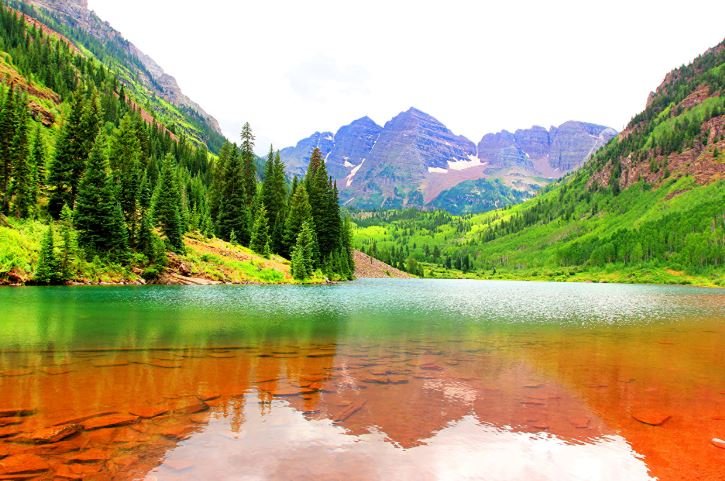1.Maroon Bells, USA
Found just around 10 miles from Aspen, Colorado, the Maroon Bells are two 14,000-foot tops in the Elk Mountains that are reflected in completely clear Maroon Lake, cuddled in a cold valley. They are the royal gems of the Rocky Mountains and by a long shot a standout amongst the most captured scenes in the nation.
It is hard to state when the ageless magnificence of these two sentinels reflected in the lake is all the more striking: In the mid year, when each climbing trail takes you through fields of wild blooms, in the fall, when tall aspen trees stun with a rainbow of fall hues, or in the winter, when snow and ice quietness the world. The best photograph open doors are from one of the many climbing trails – access by engine vehicles is constrained. The lake is well known among fly-anglers – regardless of whether they don't find anything, the magnificence surrounding them is sufficient.
2.Grand Canyon, USA
The Grand Canyon is a lofty, 1-mile-profound, and up to 18-mile-wide cut in the texture of the world, a tremendous crevasse cut by the Colorado River throughout the most recent 5,000 years. Its sheer size is amazing and in spite of the fact that you can see just a little bit of it even from the best vantage point, its topography and its age fire the creative ability. The layers of beautiful shake demonstrate the progression of time and a portion of the stones at the base are 1,8 billion years of age.
There is a great deal of life developing on the gorge's precarious sides – you can see a greater amount of it climbing the trails of the northern edge, where it is additionally less swarmed. The vast majority limit their visit to the amazing perspectives from the southern edge. Probably the most well known perspectives are Yavapai Observation Station, Mary Colter's Lookout Studio, and Mather Point.
3.Blue Ridge Mountains, USA
Situated in the eastern United States and part of the gigantic Appalachians, the Blue Ridge Mountains extend from their southernmost end in Georgia the distance northward to Pennsylvania. Between the Blue Ridge and whatever remains of the Appalachians lies the Great Appalachian Valley. At the point when seen from a separation, the Blue Ridge Mountains seem blue – the trees that discharge a gas called isoprene are in charge of the pale blue shading and hence the mountains' name.
Inside the Blue Ridge Mountains are two huge national stops: The Shenandoah and the Great Smoky Mountains. The most ideal approach to appreciate and become acquainted with Blue Ridge is by taking the Blue Ridge Parkway, a 469-mile-long lovely beautiful expressway that keeps running along the edge together with the famous Appalachian Trail and which associates the two parks.


